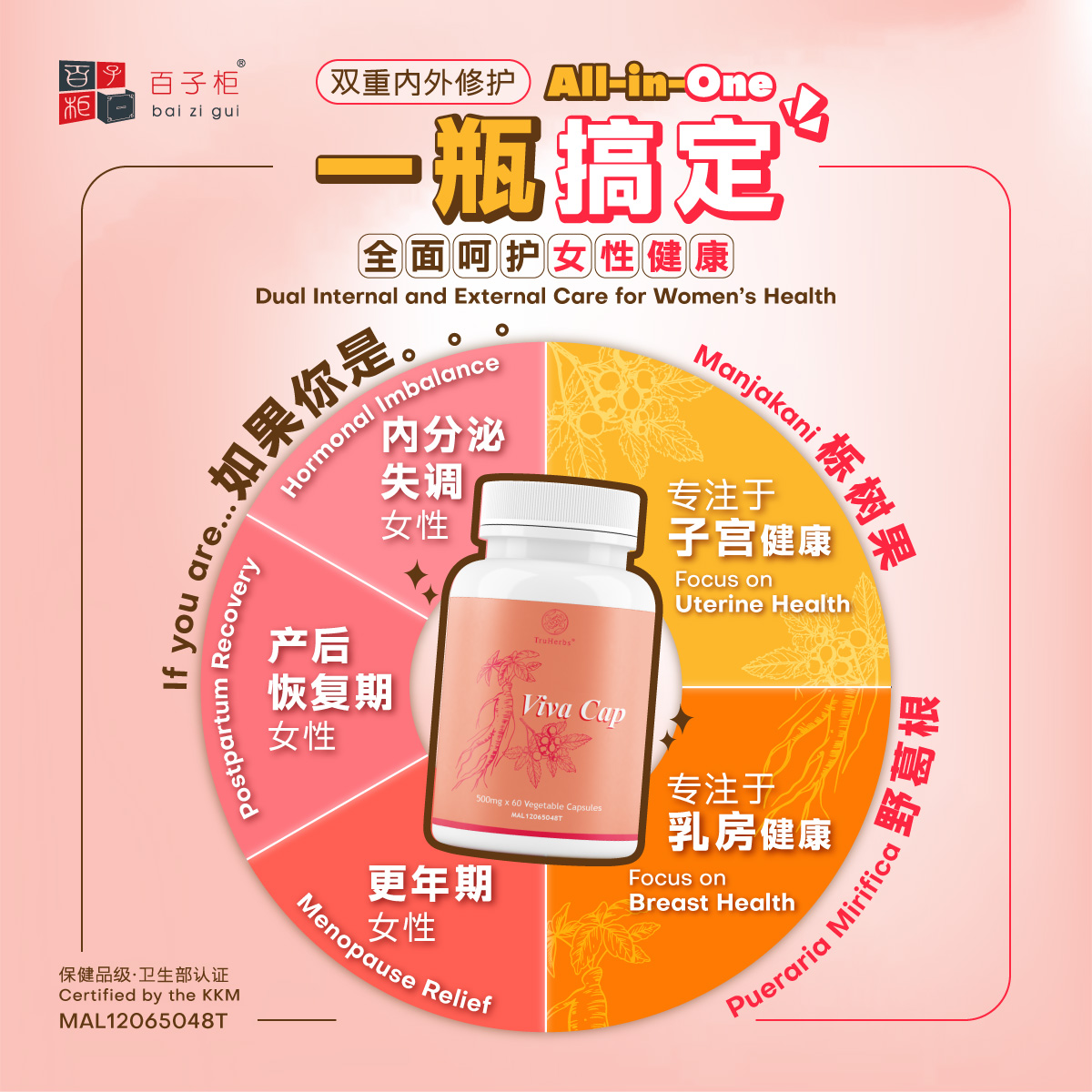Hormonal Imbalance and Emotional Health: A Deep Dive into the Mind-Body Connection | Bai Zi Gui

Have You Ever Felt Like This?
Snapping over small things. Emotions on a rollercoaster. Exhausted all day but staring at the ceiling at night. Periods irregular, skin oilier, and weight fluctuating.
Under daily work and life pressure, manyespecially womenare feeling the effects of hormonal imbalance. Yet few realize their mood dips and chronic fatigue may be signals from their hormones.
Hormonal imbalance does more than affect your body. It shifts your emotional chemistry, changes how you relate to others, and rewires your perception of life.
This guide explores:
- Signals your body sends when hormones go off balance
- How hormones shape your brain and emotions
- How stress worsens hormonal health
- And most importantly, how to restore harmony using holistic, sciencebacked methods
Your Body’s Warnings: Common Signs of Hormonal Imbalance
Hormones are your body’s internal messengers. When balanced, they stabilize energy, mood, metabolism, and cycles. When imbalanced, the signs show up quickly:
A. Emotional Instability
- Anxiety, irritability, mood dips
- Linked to estrogen and serotonin disruptions
B. Physical Red Flags
- Insomnia, fatigue, irregular periods
- Imbalanced hormones disrupt your sleep and cycle
C. External Changes
- Oily skin, weight gain or loss, hair thinning
- Estrogen, testosterone, and thyroid changes affect appearance and metabolism
Bottom line: Emotional symptoms are often the first cluebut the easiest to ignore.
How Hormones Influence Your Brain and Mood
Emotions aren’t just psychologicalthey’re biochemical.
A. Estrogen and Serotonin
Estrogen supports serotonin, the “feelgood” neurotransmitter. Fluctuating estrogen lowers serotonin, increasing mood volatility.
B. Progesterone and Sleep
Rising in the second half of your cycle, progesterone calms the brain. If low, you may struggle to sleep and feel heightened anxiety.
C. Cortisol and Stress
Chronic stress keeps cortisol elevated, leading to anxiety, fatigue, brain fog, and inflammation.
In short: Your hormones are your brain’s chemical conductors. When out of sync, everything from emotions to focus suffers. Are You Silently Suffering From Mysterious Symptoms? It Might Be Hormonal Imbalance
How Stress Throws Hormones Further Off Track
Hormonal balance and mental health form a feedback loop. When one suffers, the other follows.
A. Anxiety Overloads Your Endocrine System
Prolonged stress overworks your adrenal glands, draining your ability to regulate hormone output.
B. Poor Sleep Disrupts Hormonal Timing
Hormones regenerate during deep sleep. Irregular rest reduces melatonin and impacts reproductive hormone cycles.
C. Bottled Emotions and Bad Nutrition Compound the Issue
Low B6, magnesium, and zincoften missing in stresseaters or crash dietersblock hormone production.
Takeaway: Mind and body are one system. Stress isn’t just a symptomit’s also a root cause.
Restoring Balance: A WholeBody, ScienceBacked Approach
A. Improve Sleep Hygiene
- Aim for 78 hours of restful sleep
- Keep a consistent schedule
- Limit screens 30 minutes before bed
B. Eat to Support Hormones
- Vitamin B6: bananas, chicken, whole grains
- Magnesium: spinach, nuts, dark chocolate
- Omega3s: salmon, flaxseed, walnuts
C. Move and DeStress Smartly
- Meditation and breathwork reduce cortisol
- Yoga, walking, dancing ease anxiety naturally
- Aromatherapy with lavender or ylangylang soothes the nervous system
D. Seek Professional Help When Needed
Don’t ignore symptoms like extreme fatigue, cycle loss, or depressive episodes. Consult a health expert to rule out PCOS, thyroid issues, or depression.

Product Spotlight: TruHerbs VIVA Cap
To support women in balancing hormones naturally, we highly recommend TruHerbs VIVA Cap. Formulated with premium herbal ingredients, TruHerbs is designed specifically for women facing hormonal challenges.
Why Choose TruHerbs?
- Botanical-Based Balance: Combines time-tested herbs known for regulating endocrine function.
- Hormone Harmony Support: Eases PMS, menopausal symptoms, and postpartum recovery.
- Energy & Mood Booster: Enhances vitality and emotional stability.
- Non-Synthetic & Gentle: Suitable for long-term use without harsh side effects.
Whether you're in perimenopause, recovering post-birth, or struggling with monthly imbalances, TruHerbs can help reset your rhythm.
FAQs
Q: Can hormone imbalance cause depression?
Yes. Estrogen and cortisol imbalances affect serotonin, increasing depression risk. Early support is key.
Q: Can traditional Chinese herbs help?
Herbs like dang gui, astragalus, and bupleurum may aid regulationbut consult a TCM practitioner first.
Q: Who’s most vulnerable?
Women in hormonal transition (puberty, postpartum, perimenopause), shift workers, and highstress individuals.
Q: Can fixing sleep habits alone help?
Absolutely. Sleep regulates cortisol and melatonin, critical for hormonal balance.
Q: When should I see a doctor?
If symptoms are chronic or severecycle loss, panic attacks, thyroid issuesseek medical attention.
Final Thought: Protecting Your Emotional Thermostat
Hormones may be invisible, but they shape how you feel, rest, think, and connect. Instead of waiting for burnout, invest in hormonal resilience now.
Explore Bai Zi Gui’s herbal hormone support to gently rebalance your body and mindgiving you clarity, energy, and inner stability to thrive.

 Bahasa melayu
Bahasa melayu 中文
中文






















